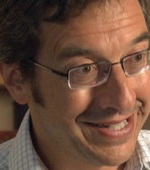The Green Interview:
Silver Donald Cameron Speaks With George Monbiot
George Monbiot is one of the world's most influential, original, and courageous environmental journalists. A regular columnist with the British newspaper The Guardian, and a regular presenter of documentaries on the BBC, he’s the author of seven books including his 2006 book, Heat: How To Stop The Planet From Burning, which he describes as “a thought experiment” designed to see whether Britain could achieve a ninety percent reduction in carbon emissions without economic or social catastrophe. To test, in other words, whether his own ideas are nonsense…a form of courage that very few of us can claim. This interview with Monbiot by Silver Donald Cameron was recorded in September of 2012.

George Monbiot |
George Monbiot:
I'm driven by a strong sense of injustice, a strong a sense that time is running out, that we live on a wonderful, precious, unique, and beautiful planet, full of wonders of all kinds, and we are trashing it without hardly any cognizance of the damage that we’re doing. I just can’t stand by and watch that process take place without doing everything I can to try to stop it.
And of course at the same time as we’re trashing the natural wonders of the world, we’re destroying the lives of countless people now and in the future. We’re allowing governments and corporations to do enormous damage to people’s lives and to their livelihoods. You simply cannot stand by and let that happen without doing what you can if you’ve got any sense of empathy, any human values. You can’t just watch that process take place. And, I am in a privileged position. I am a middle class Westerner with a good education, with a lot of confidence, with media skills – not to use all that when we are in this period of extraordinary global crisis, not to use it to stand up and to speak out about these things, would be a profound moral dereliction.
Silver Donald Cameron:
I agree with you. But of course, traditionally as a journalist, you’re supposed to be objective, right? You're not supposed to be taking sides, but you do this routinely. You study something, you arrive at conclusions, and you’re not shy about expressing them.

Silver Donald Cameron |
Monbiot:
I think you can draw a distinction between objectivity and impartiality. I am not impartial, I’m partial. I am very partial to protecting the environment. I am very partial to human rights. I am very partial to social justice. But in trying to determine what needs to be done and in trying to analyze where the problems are coming from I try to be as objective as possible. I try to sift the facts, to go the source of the information all the time, to look for countervailing sources of information, to try to work out who’s speaking rubbish, who’s providing straight facts, and to try to work out whether I am on the right side of the issue or not and then if I am on the wrong side of the issue, to switch over.
Cameron:
You described Heat as a thought experiment. Tell me what that experiment was for those viewers who have not read the book.
Monbiot:
Well, the thought experiment was to take a large post-industrial economy – namely the United Kingdom – as my experimental model and to see whether we could engineer a ninety percent cut in greenhouse gas emissions without turning us into a third world country. That was the challenge which was effectively set to me at the beginning of the exercise when I was asked at a public meeting what this county would look like if we did introduce that massive cut in greenhouse gases that I was calling for. And, at that time, which was several years ago, I hadn’t really thought about it, but sitting in the front row there was a great climate expert, Mayer Hillman, and I said, “Well, that’s such an easy question, I’ll give it to Mayer to answer,” and he stood up and said, “A very poor third world country.”
I thought, well, if we tell people, you’ve got to give up just about everything that you’ve become used to in order to cut greenhouse gas emissions, they’re not going to buy into that program. It’s just not going to happen. So the challenge I set myself was to say, “How are we going to engineer this massive cut, a ninety percent cut, which is required in the rich nations if we're to have any hope of staying within two degrees of global warming? How are we going to do that without causing that massive destruction of living standards?” So that was the thing I set out to do with Heat. I think I was able to show that, yes, we can do it through some clever and subtle means of demand reduction and substituting other sources of energy. It takes political will, it takes some courage to do it, but economically, politically, socially, we can do it, and we can afford to do it.
Cameron:
The response to Heat is that it seemed to cause a lot of talk and a lot of concern, and I think you’re right, I think you did show that it’s possible –maybe not to ninety percent – but you can make a huge, huge reduction in greenhouse gases. But nothing happened. And in fact, we went backward.
Monbiot:
You know, “nothing happened” is a pretty fair summary of the past twenty years of policy in environment. Not just on climate change but right across the environmental spectrum: Nothing happened. The governments of the world at the moment are entirely incapable of rising to this challenge. It’s not just this challenge; they’ve effectively become incapable of government. What they’re there for, it seems now, is to manage the transition to a fully corporate economy and a fully corporate political system. And they act on behalf of big corporations and the individuals with an awful lot of money and their aim seems to be effectively to engineer a transition from democracy to plutocracy: to govern by money and the monied classes.
Cameron:
There’s also a kind of suicidal character to all of this too because the plutocracy is not going to survive a fried planet, either, right?
Monbiot:
Paradoxically, of course, the people driving the problem, more than any others – the executive class, the plutocratic class – they are the last to get hit because they can always buy their way out of trouble. They can move. They’ve got the money to insulate themselves to a far greater degree than anyone else. But eventually it’s going to affect them in one way or another.
Within the scientific literature now, there have been several prominent papers published showing that pattern is now well established. That we’re looking at a far greater frequency of extreme events than we saw in the past. But in the popular perception, it’s like, “Oh, the weather has always changed, there have always been records set in one place or another,” but it’s the number of records, the frequency with which those are being set, the number of extreme events, the number of droughts and floods and storms – that has changed. It’s changed profoundly.
Cameron:
One of the themes that’s come out of this majority Conservative government in Canada is something that we’ve been calling “the death of evidence.” The government is basing its decisions…it’s closing down all the sources of information, all the research, all the science, and so on, that would threaten its ideological world-view.
Monbiot:
Yes, I saw a few very powerful articles about how you’ve got a government which is deeply hostile to hearing the scientific evidence and as you say is shutting it down. It’s an extraordinary thing to witness from this side of the Atlantic: to watch Canada, this highly sophisticated, liberal, outward-looking nation, turning into a thuggish petro state. To see it succumbing to the resource-curse in the same way as Nigeria or Saudi Arabia or anywhere else, where you basically have a group of oligarchs who control the fossil fuel revenues and end up controlling the political system.
Normally, countries go through a transition the other way. They start off with primary production: mineral extraction, agriculture, and they move to secondary production in industry, they then move to tertiary production going more into the knowledge economy, service economy, and the rest of it. Canada, very rapidly, is going the opposite way down that slope. It's going from being a very sophisticated tertiary economy back to being a primary producer of the dirtiest mineral of all, which is tar sands, with horrendous environmental consequences. And that is changing the entire nature of that nation. It’s changing its political character in deeply frightening ways and it’s turning into a giant Texas, or a giant Alabama. [Laughs] It’s really scary to see how, in some ways, [Prime Minister] Harper has taken it to a far more extreme level of neo-conservatism and neo-liberalism even than George Bush contemplated.
To see this full one-hour interview (in video, audio or transcript), go to www.TheGreenInterview.com and sign up for a free one-week subscription. The site offers more than sixty in-depth interviews with environmental giants from around the world. Silver Donald Cameron, host and executive producer at The Green Interview, is one of Canada’s most respected authors and broadcasters. The Living Beach, his classic book on the ecology of shorelines, is published by Red Deer Press.
|

